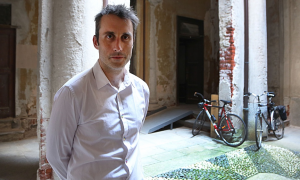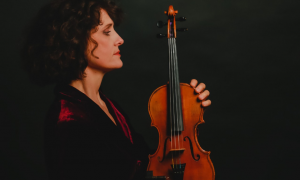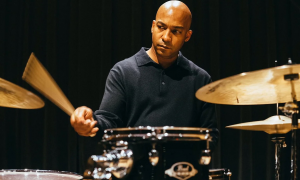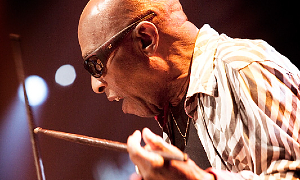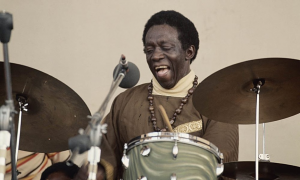Home » Jazz Articles » Interview » Roy Haynes: Still Lighting It Up
Roy Haynes: Still Lighting It Up
Miles Davis and I, we used to race cars... we both bought our first cars maybe it was June of 1950. I was working with Charlie Parker. And we would take those cars, and none of us had a license, we used to smash 'em up, race 'em through Central Park, goin' through the lights, the whole thing...
Drummer Roy Haynes isn't just cool—he's cooooolllll.
In conversation, Roy Haynes is languid and relaxed yet full of fire, yet playful, mysterious and serious. Similarly, his music—and he's played alongside the best—is simultaneously passionate and precise, free-swinging and loose, but erudite and eloquent. In short, the Roy Haynes you meet in conversation speaks volumes about his drumming; and Haynes' music, more than with many other artists, seems to be an appendage of his person.
Haynes has played with just about everyone in just about every style in the past half-century of jazz: Lester Young, Bud Powell and Miles Davis in the late 1940s; Charlie Parker from the late '40s into the 1950s, and then Sarah Vaughan, Thelonious Monk and Eric Dolphy up until the 1960s. He was Elvin Jones' principal backup in the great John Coltrane Quartets of the 1960s, and has since graced performances and recordings by the likes of Oliver Nelson (on the classic Blues and the Abstract Truth), Stan Getz, Dizzy Gillespie, Gary Burton, Miroslav Vitous, Pat Metheny, and just about everybody else too.
Roy Haynes was inducted into the Jazz Hall of Fame in 1993 and the following year was named a recipient of "the jazz world's Nobel prize," the JAZZPAR Award. Haynes is currently on a tour of North America which began this past July and concludes in November, sponsored by the Lila Wallace Reader's Digest National Jazz Network and presented by the New England Foundation for the Arts; he recently concluded the "Remembering Bud Powell" Tour with, among others, Chick Corea and Joshua Redman.
If all that wasn't enough, this year the 72-year-old stalwart also saw Evidence Music release True Or False, a 1986 live performance with his longtime touring band of pianist Dave Kikoski, bassist Ed Howard and Ralph Moore on tenor sax. Haynes' previous album, Te Vou! (Dreyfus Jazz), with Donald Harrison on alto sax, Metheny, Kikoski and bassist Christian McBride, won the Best Contemporary Jazz Recording for 1995 at the convention of The National Association of Independent Record Distributors and Manufacturers.
Both Te Vou! and True or False sample heartily from the robust catalog of classic and modern jazz composers: True includes compositions by Duke Ellington ("In A Sentimental Mood"), Parker ("Big Foot"), Corea (twice, with "Bud Powell" and "Psalm"), Wayne Shorter ("Fee-Fi-Fo-Fum"), Sonny Rollins ("The Everywhere Calypso") and Monk (the ingenious "Played Twice"); Te Vou! presents more Corea ("Like This") and Monk ("Trinkle Twinkle"), along with tunes from Charlie Haden ("Blues M45") and Ornette Coleman ("Trigonometry"), and several Metheny originals, including his gorgeous ballad "If I Could."
Amazingly, Haynes stood still just long enough for the following interview.
All About Jazz: If you had to put your finger on the one thing about Te Vou! that really pleased you the most, what would it be?
Roy Haynes: It would probably be that it won that award, I would think. Though I guess you want to hear about the music, but I didn't expect it to win an award.
AAJ: How were able to get everybody into the studio at the same time, or didn't everybody get into the studio at the same time?
RH: We were all there together at the same time. You know, when you've been playing as long as I've been playing, and you've played with a lot of the very important people of this music, and you're still active and you're still creative, a lot of people would like to play with you. That's the situation, to be very frank about it. To be truthful.
RH: It happens that I am one of the ones left from the period when I was much younger (naturally), when Parker and Young and these people were out here. So it puts me in a very unique position I'm sure, and... you know, it just continues to go on and on and on. In fact, I had scheduled to do that Te Vou! date, I also had Branford Marsalis scheduled for that. He had come in from California, he was doing The Tonight Show during that time. And the recording was done in an old film studio in Queens. And, from what I understand, he was there early in the morning, I think he came in from California that morning, it seems that he must have went straight there, because he had signed in, you had to sign in that particular studio, and I found out during the recording that he had signed in, but I never saw him. So we never knew what happened. I haven't seen him to talk to him since then, but the date turned out to be quite interesting as it was. Donald Harrison did the whole thing as far as the saxophone chair was concerned.
AAJ: Who over the course of your career has been the bassist with whom you've felt the most empathy? (There's a follow-up question if you choose to gracefully deflect this one.)
RH: You know, it's hard, for me anyhow, to pinpoint one person for anything. It's really hard; like, a lot of times, people will ask me, 'Who out of all the drummers today would you think is the greatest or the most interesting?' And, if I would answer that, I know after I would finish there would be many many other drummers I could think of that are so great that to put forth just one person... I liked Paul Chambers, I liked... Jesus Christ, you know? Some of the guys who are living now. Questions like that are not always easy. For me. I would start naming one person, then I would think later, or I would wake up in the middle of the night, 'Oh, I should have mentioned this other guy, who I like as well.'
AAJ: Is there someone that you have not yet played with whom you think you'd make an interesting rhythm section?
RH: No, there probably is but I can't think of it.
AAJ: Do you listen to much jazz radio programming, and would you like to address the fashionable 'smooth jazz' radio approach?
RH: Did you say 'smooth jazz'? No, I'm not into 'smooth jazz' particularly. I'd rather listen to some classical stuff than listen to 'smooth jazz.' Maybe after hearing a couple of tracks I'd be ready to change the station.
AAJ: Do you have a favorite classical composer?
RH: No, I like Bartok, I like... you know, I just scan. When I hear it and it sounds pleasant, sometimes I don't know who it was written by, who wrote it or anything. Certain things... I like a lot of the old stuff. I'm loose, I've got very good ears, I listen to a lot, but I don't have a lot of the details of the situations of the music.
AAJ: A word that frequently comes up in written descriptions of your music is "elegant."
RH: Well, I don't know what you've been reading, or what you've been listening to.
AAJ: Are you involved in any other media other than music? Do you write, do you paint?
RH: I paint pictures on the drums laughs. I paint music...I'm an artist.
AAJ: See, that's it—your playing seems more so than a lot of drummers' to be nearly cinematic, in that there's a broad scope, there's a wide range of 'colors' that you use. So it occurred to me that such an artist may be interested in other vehicles of expression.
RH: When I was much younger, when I was in school, I was into all of that, you know. Took up the paintbrush and do watercolors, and I loved all of that. Then I'm into clothes—years ago I was listed in Esquire magazine, Miles Davis and myself were the only two musicians listed in an article written by George Frazier, I think the article was written in the fifties and published in Esquire magazine, 1960 I think that was the exact year. And he talked about my taste for wearing clothes. We happened to go to the same tailor during that period, which was The Andover Shop, there was one in Andover Massachusetts and there was another one in Cambridge, Mass. You know, I'm into colors and all that; in fact, I was just calling up about an automobile, a Lincoln, you know. So, there's something to that, I would think.
AAJ: What's the best piece of advice that anybody ever gave you as far as playing the drums?
RH: I can't remember too much of the advice when I was very young, naturally. But the advice I would suggest for anybody starting to play any instrument—music—is really keeping your ears open. Because a lot of youngsters, first thing they do is they learn how to read music a lot. That's the eye. Seeing. Everything is visual these days, video this, video that. But your EARS, listen to everything. Even things... I don't want to say things that you don't like, but listen to EVERYTHING and stay focused on what you're trying to do. Drums or whatever. But you keep your ears open, that'll take you a long way while you're playing with other musicians and when you're just listening to music, whether you're listening to the radio or to records or whatever.
AAJ: What's one thing that you think is pretty interesting about yourself that most people don't know about you?
RH: I don't know. Because I'm constantly traveling all over the world and people come up with some of the damnedest things. I can't put my finger on any one thing.
AAJ: Is there any single impression that you'd like AAJ readers to have of Roy Haynes as a result of this interview?
RH: I don't know. I was recently asked that question. And the host of the show, it was done on National Public Radio and the host of the show was Nancy Wilson. And she said Roy Haynes was lost for words trying to describe how he wanted to be remembered, or something like that. I don't know, man. I don't really think like that. I just... whatever I do, there are a lot of people in the world who are aware of it and appreciate it, and that makes me feel good. If you can continue to, now I know everybody won't, but if people like you have the chance to come and hear me perform, the answer will be there, I'm sure.
AAJ: Do you feel a lot younger than your age?
RH: Now, do I feel younger? Or you mean, than I am? Yes, sometimes I do. Not when I wake up in the morning, particularly. Sometimes even when I go to bed early, sometimes maybe I didn't really rest, maybe I was chewing on something or eating something, or maybe had too much cognac or too much champagne or something. Sometimes I feel good. Yesterday I was riding my ten-speed bike, and it was good. Right now I'm good.
AAJ: McCoy Tyner had a great response to this: What would you say you were like away from your instrument, your drums?
RH: I've got three cars, and one of my cars in shows has won many trophies. I've got a 1974 Brickland, the sixth one off the assembly line. In fact, I was invited to a show Sunday but I was working at The Iridium here in New York near Lincoln Center, so I couldn't make that one. Because I've been in that show the last couple of years, and always won first prize.
Anyhow, I'm into enjoying life. I have three children, I have five grandchildren, I've got a granddaughter in Philadelphia. My oldest son Craig has a daughter there. My daughter has three daughters and one son, so I only have one grandson. And he's into playing drums and he sounds goo-oo-od, he's into it, he's into his sports. I still didn't answer your question, I realize that.
AAJ: No, actually, you answered one from a couple of questions ago, you've told us something that most of us didn't know about you before.
RH: The clothes?
AAJ: Yes, and the car thing.
RH: Miles Davis and I, we used to race cars... we both bought our first cars maybe it was June of 1950. I was working with Charlie Parker. And we would take those cars, and none of us had a license, we used to smash 'em up, race 'em through Central Park, goin' through the lights, the whole thing... (trails off in laughter). So that's been part of my thing. Now, I'm getting older, you know, my vision at night is not that good. At least the way they drive these days. I'm always up to the speed limit, but that's not fashionable, to do the speed limit these days. You've got to go faster than that. So, it's a gas. I feel good.
AAJ: You lit me up, too. Can I ask you what McCoy said?
RH: Certainly, he said that he was a guy, you know? He loves to go to plays, he loves to go to musicals. Because he plays in Europe so often, he has a lot of friends in Europe and when they come over here and he's in Philly or New York they insist on going to shows, so he's seen Cats something like 55 times. He loves to cook, he loves to spend time with his family—he loves to just enjoy his life. And that opened our conversation up to: It's important TO your music to have a focus OUTSIDE of music.
Oh, sure, that's definitely yes. It helps keep you IN the music, it makes you enjoy the music. I have to get away from it. But I never do one hundred percent, because I'm always into, I think in rhythms and bang in rhythms, even when I'm driving.
AAJ: Do your ears ever 'get tired' to where you need to not hear any music at all for a while?
RH: Sure, but in a different way—I like to get away from the guys in my band, and get away from the music that we play. But after a long period, then I become a different person. Like I'm whacked out, as the youngsters would say. Because playing is part of my therapy, playing drums. But when I get away from it, when I come back, I'm like a wild man. You gotta tie me down, you know? When you let a tiger or a lion outta his cage so I try to pace myself and not overplay, you know?
I was taking long periods when I wouldn't perform. I was saying I was semi-retired. But the last couple of years... well, look, even now, sometimes like when I come back from Europe, I don't look at the drums, I don't touch anything for a long time. Till sometimes more than a month. But I got all these bookings now, they're driving me crazy, you know? But it's good.
Tags
Interview
Roy Haynes
Chris M. Slawecki
Lester Young
Bud Powell
Sarah Vaughan
Thelonious Monk
Eric Dolphy
Elvin Jones
John Coltrane
Oliver Nelson
Stan Getz
Dizzy Gillespie
Gary Burton
Miroslav Vitous
pat metheny
Chick Corea
Dave Kikoski
Ed Howard
Ralph Moore
Donald Harrison
Christian McBride
Wayne Shorter
Sonny Rollins
Charlie Haden
Ornette Coleman
Nancy Wilson
Philadelphia
Miles Davis
Charlie Parker
Comments
PREVIOUS / NEXT
Support All About Jazz
 All About Jazz has been a pillar of jazz since 1995, championing it as an art form and, more importantly, supporting the musicians who make it. Our enduring commitment has made "AAJ" one of the most culturally important websites of its kind, read by hundreds of thousands of fans, musicians and industry figures every month.
All About Jazz has been a pillar of jazz since 1995, championing it as an art form and, more importantly, supporting the musicians who make it. Our enduring commitment has made "AAJ" one of the most culturally important websites of its kind, read by hundreds of thousands of fans, musicians and industry figures every month.













